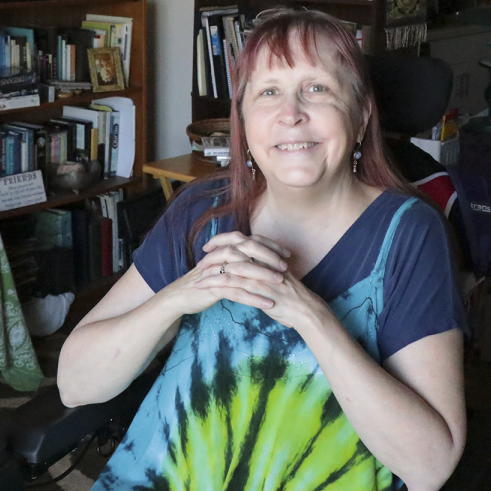A Rolling Perspective: To Thine Own Self Be True

NO-NO-NO! it screamed.
You may have heard the joke about the fellow who, after watching a TV ad for tampons showing women swimming, sky diving, playing tennis and such, went out and bought a box for himself. When his friend asked why on earth he’d done so, he said, “I’ve always wanted to try those things.” We laugh at this, but how how often do we buy into—quite literally—another’s vision of what’s right for us, instead of discovering and then listening to our own wisdom?
Sometimes even if we know what’s true for us, we cave in. This week I agreed to a hip replacement. My Truth-O-Meter’s needle shot into the red zone in alarm. NO-NO-NO! it screamed, even as YES-YES-YES escaped my lips. I couldn’t stop myself from responding the way I knew my doctor wanted me to, despite my own conviction that surgery is not for me. When he asked me ‘why,’ though, my mouth just opened and closed like a fish who’d jumped clear of its bowl.
I’d forgotten that no two people on the planet—whether sibling, spouse, or stranger—have the exact same priorities. The surgeon and I were coming from different values. Where did I learn this? From the websites and webinars of an amazing man named Dr John Demartini.
Central to his method is the Value Determination Process, which is free and online. He has formed thirteen questions which, if answered honestly, will show you who you really are. I had to do it several times before I benefited fully. The first few times, I answered with behaviors and values that sounded noble, when what I really should have said was, “drink coffee and do the Guardian’s cryptic crossword.”
Demartini says that we always act out of our highest values, and—guess what?—everyone else is acting out of theirs. For a teenager, it might be playing computer games; for my surgeon, it’s slicing people open and sticking stuff in. The trick is to discover, first, what our values are; then find out what others’ are and pitch our desires in language that reflects their priorities.
Think about it: surgeons hail surgery as the magic fix. Internal medicine doctors prescribe wonder drugs. Physical therapists champion exercise. Each group is convinced of their method’s efficacy. I’m not saying that these are not valuable and helpful options; what I am saying is that they’re not the only ones. Further, they represent their highest priority, not mine.
Poverty, for example, is a reality for most of us who are diff-abled. Surgeons live in an entirely different reality when it comes to money. We cannot expect them to understand unless we share in terms to which they can relate. I eventually told my surgeon that while a new hip might change my walking life, it would not change my bank balance. What does it matter if I can walk to the cinema if I can’t afford to watch the film? I can’t afford it now, and a new hip won’t change that.
No doubt you’ve seen the prescription drug ads showing people climbing Machu Picchu, dancing by the Trevi Fountain, or finding love on the world cruise they can only take because they’re on this magic pill. Let’s get real! If you need this kind of medication, chances are you are waaaaaay too poor to get to Las Vegas by bus, let alone trip gaily around the world on a luxury liner. Did you know several of these medications need to be refrigerated? And that someone must deliver them personally to you? You’ll be held hostage by your medication schedule even if you can afford a cruise. To me, that’s the opposite of freedom.
The key to resisting these ads or the doctors recommending them is to be clear about what is right for you.
I eventually wrote my surgeon that I understood he wanted to increase my quality of life by giving me a new hip, but that I already had a full and joyful life. He probably thinks I’m nuts, but I cannot control his (or anyone’s) reactions. I can only speak my truth.
Living my highest priorities—like writing this—produces the happiness that eludes so many folks, “able-bodied” or not. I don’t expect a life free of physical pain (and am, quite frankly, baffled by Americans’ belief that this is even possible). A wheelchair, for me, provides a kinder, gentler means of dealing with chronic pain than surgery.
When faced with a medical choice in the future, ask yourself what you hope to gain from it. Are your expectations realistic? Are you being “the tampon guy”? And if you believe you’ll be happier if you can just get this one procedure or pill, then I urge you to question that belief. Happiness comes from honoring your own deepest desires, not swallowing someone else’s.
Jennifer Holland taught herself to read and write at age four and has been doing both ever since. Minnesota-born and Wisconsin-bred, she nonetheless inherited the Irish perchant for travel. Despite the shoestring budget, she visited a dozen countries before her diff-ablement, and even lived in Ireland for nearly fifteen years. Her encounters with other cultures inform the quirky insights into human behavior that find their expression in her poetry, novels, and non-fiction works. When she's not reading or writing, she enjoys chair yoga, video chats with her children and gradchildren, and living happily with MS on a tiny fixed income.


